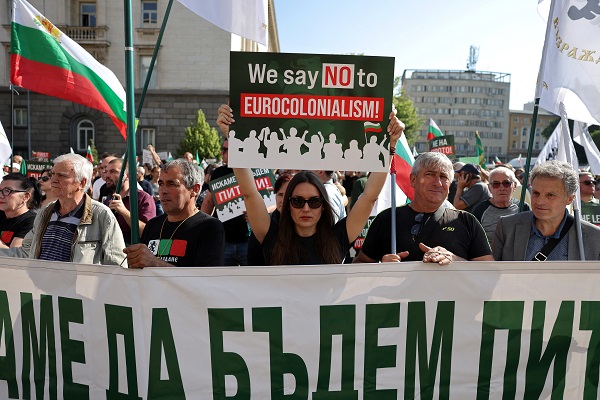 Protesters hold banners as they participate in a demonstration against the country's plans of joining the euro zone, organised by Bulgaria's ultranationalist Revival party, in Sofia, Bulgaria, 4 June 2025;
Credit: Reuters/Stoyan Nenov
Protesters hold banners as they participate in a demonstration against the country's plans of joining the euro zone, organised by Bulgaria's ultranationalist Revival party, in Sofia, Bulgaria, 4 June 2025;
Credit: Reuters/Stoyan Nenov
BANSKO, Bulgaria (Reuters) - Igor Ruge, a hotel manager at a ski resort in southern Bulgaria, welcomed news on Wednesday 4 June 2025 that the European Commission had given his country the green light to join the euro zone next year. The approval could mean more foreign tourists and investment for the EU's poorest country.
"It will be much easier for everyone within the euro zone to understand our value [...] and to understand that Bulgaria is one of the most attractive countries for winter and summer vacation," said Ruge, who runs two hotels in the town of Bansko.
Bulgaria, a Balkan country bordering the Black Sea, joined the European Union in 2007. It will become the 21st country to adopt the euro on 1 January 2026. The change will ease trade flows and give it a seat on the European Central Bank's rate-setting Governing Council.
Despite the expected gains, however, many in Bulgaria are sceptical. Widespread corruption, stark income inequality and a four-year political crisis marked by a series of snap elections and weak coalitions has eroded trust in authorities. Many fear a rise in prices during the switch, as had occurred in other countries that joined over the past decade.
A Eurobarometer poll published last month by the European Commission indicated that 50% of Bulgarians did not support the common currency, up from 46% in November 2024.
"When you don't trust the institutions in the country, it is much harder to make any transition [...] especially when it comes to joining the euro," Petar Ganev, senior research fellow at Bulgaria's Institute for Market Economics, told Reuters.
The government, whose ministries welcomed the announcement as a deserved outcome after a decade-long endeavour, on Wednesday said it would work to prevent practices that may compromise trust in the switchover.
"It is important to ensure constant monitoring related to pricing, so that Bulgarian citizens and businesses can rest assured that no unjustified price increases will be allowed during this period," finance minister Temenuzhka Petkova told a news conference.
Central bank governor Dimitar Radev said technical and logistical infrastructure that had been already built should be brought into "euro zone" mode, and the bank will assist the government in conducting an information campaign about the euro.
Already everyday goods in shops are listed in euros as well as the Bulgarian lev currency to get people used to the conversion. Still, vocal political opposition remains. Thousands attended a protest organised by the far-right Revival Party outside parliament in the capital Sofia on Wednesday in which demonstrators waved Bulgarian flags and chanted "no to Euro colonialism".
With an average monthly salary of 2,443 leva (€1,249), Bulgaria is the poorest country in the European Union. Populations in rural areas outside Sofia will be most vulnerable to inflation.
Nikola Ragev, a 75-year-old pensioner, was selling vegetables in the town of Pernik, some 20 kilometres west of Sofia on Tuesday 3 June 2025. He was worried that the euro would further impoverish the country.
"The change will be hard... People have become very poor and count their stotinki [pennies] when they shop, not euros," he said.








